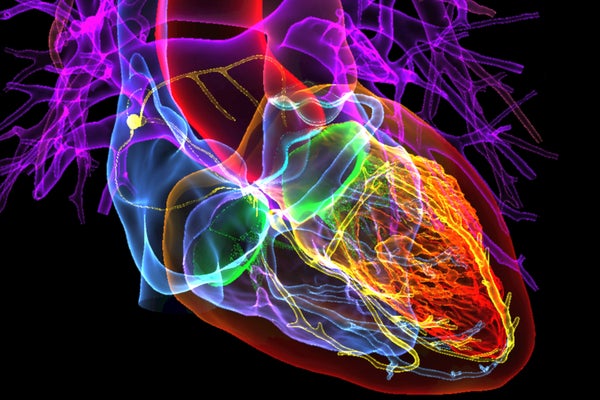Organs Age in Waves Accelerating at 50 Years Outdated
Ageing is a fancy course of that performs out in a different way throughout completely different organs, in accordance with rising proof

Colour enhanced computed tomography (CT) scan of the human coronary heart, highlighting the cardiac conduction system (yellow).
It’s a warning that middle-aged individuals have lengthy supplied the younger: ageing isn’t a clean course of. Now, an exhaustive evaluation of how proteins change over time in several organs backs up that concept, discovering that folks expertise an inflection level at round 50 years previous, after which ageing seems to accelerate.
The study, published 25 July in Cell, additionally means that some tissues — particularly blood vessels — age faster than others, and it identifies molecules that can hasten the march of time.
The findings add to mounting proof that ageing isn’t linear, however is as an alternative pockmarked by intervals of speedy change. Even so, bigger research are wanted earlier than scientists can label the age of fifty as a disaster level, says Maja Olecka, who research ageing on the Leibniz Institute on Ageing — Fritz Lipmann Institute in Jena, Germany, and was not concerned within the research.
On supporting science journalism
Should you’re having fun with this text, think about supporting our award-winning journalism by subscribing. By buying a subscription you’re serving to to make sure the way forward for impactful tales concerning the discoveries and concepts shaping our world at this time.
“There are these waves of age-related adjustments,” she says. “However it’s nonetheless tough to make a basic conclusion concerning the timing of the inflection factors.”
Exhibiting their age
Earlier work has proven that different organs can age at different rates. To additional unpick this, Guanghui Liu, who research regenerative medication on the Chinese language Academy of Sciences in Beijing, and his colleagues, collected tissue samples from 76 individuals of Chinese language ancestry aged 14 to 68 who had died from unintended mind harm. The samples got here from organs representing eight of the physique’s programs, together with the cardiovascular, immune and digestive programs.
The researchers then created a compendium of the proteins present in every of the samples. They discovered age-related will increase within the expression of 48 disease-associated proteins, and noticed early adjustments at round age 30 within the adrenal gland, which is chargeable for producing numerous hormones.
This tracks nicely with earlier information, says Michael Snyder, a geneticist on the Stanford College Faculty of Drugs in California. “It suits the concept your hormonal and metabolic management are an enormous deal,” he says. “That’s the place a few of the most profound shifts happen as individuals age.”
Between the ages of 45 and 55 got here a turning level marked by massive adjustments in protein ranges. Essentially the most dramatic shift was discovered within the aorta, the physique’s major artery, which carries oxygenated blood out of the center. The staff tracked down one protein produced within the aorta that, when administered to mice, triggers indicators of accelerated ageing. Liu speculates that blood vessels act as a conduit, carrying molecules that promote ageing to distant locations all through the physique.
The research is a vital addition to others which have analysed molecules circulating within the blood, quite than tissue samples taken from particular person organs, as a strategy to monitor age-related adjustments, says Snyder. “We’re like a automotive,” he says. “Some components put on out quicker.” Figuring out which components are vulnerable to put on and tear may also help researchers to develop ways to intervene to promote healthy ageing, he says.
Midway to 100
Final 12 months, Snyder and his colleagues discovered ageing inflection points around the ages of 44 and 60. Different research have discovered accelerated ageing at completely different occasions, together with at round 80 years previous, which was past the scope of the present research, says Olecka.
Discrepancies with different research can emerge from their use of various sorts of samples, populations and analytical approaches, says Liu. As information construct over time, key molecular pathways concerned in ageing will most likely converge throughout research, he provides.
These information will accumulate quickly, says Olecka, as a result of researchers are more and more incorporating detailed time collection of their research, quite than merely evaluating ‘younger’ with ‘previous’. And people outcomes may assist researchers to interpret these intervals of speedy change. “At present, we don’t perceive what triggers this transition level,” she says. “It’s a extremely intriguing rising discipline.”
This text is reproduced with permission and was first published on July 25, 2025.


